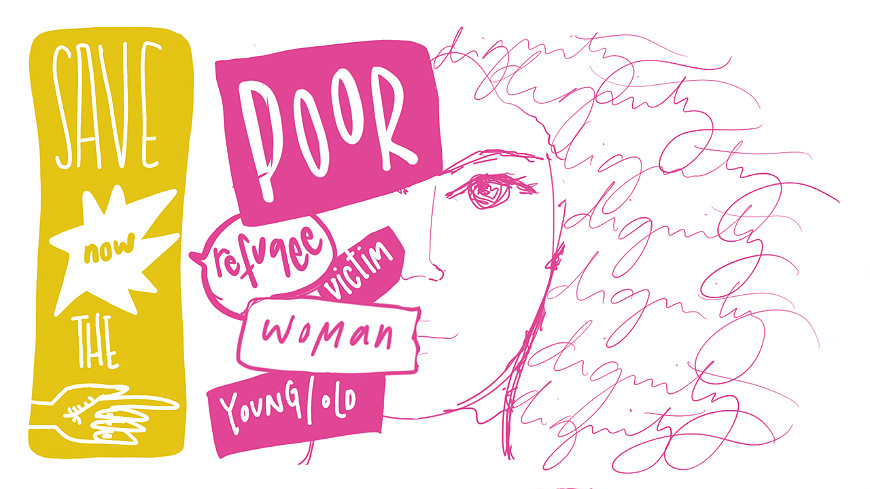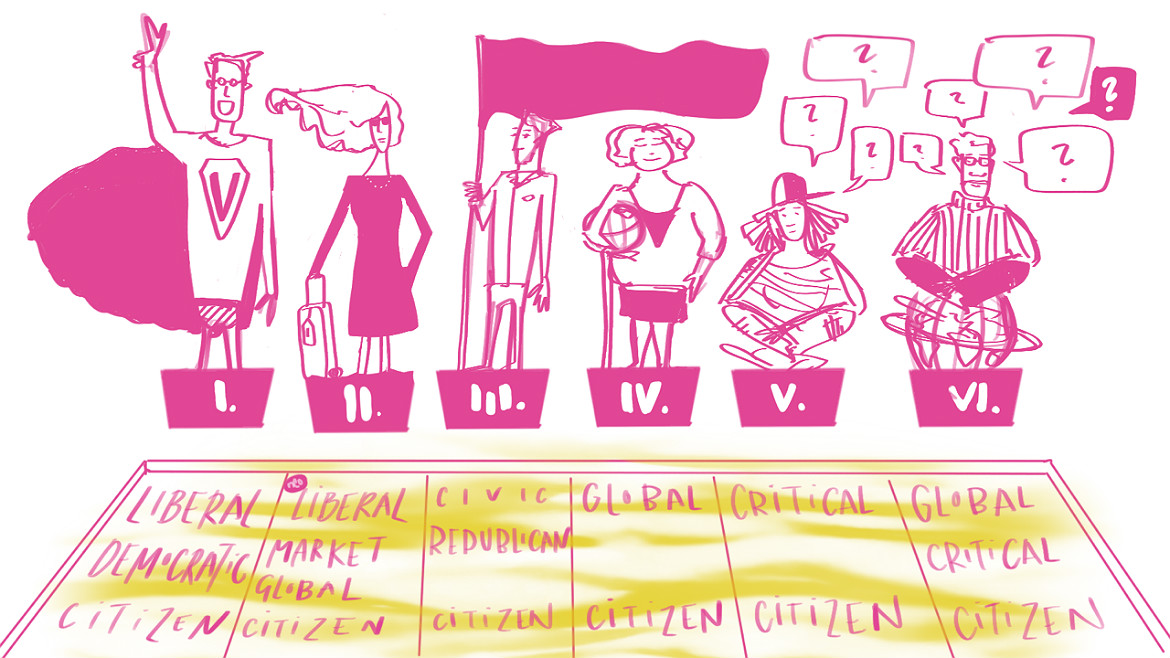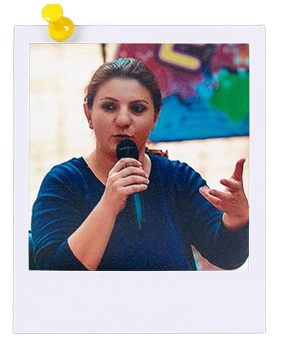European youth work: a hub for global critical citizens?
by Bryony Hoskins and Zara Lavchyan
02/11/2018
European citizenship is a concept that we have worked on and sometimes struggled with from the very start of the youth partnership 20 years ago. Our experiences of the partnership, and more broadly in the youth sector, provide a useful position in which to reflect on the meaning of European citizenship in youth work today. This article provides the outcome of this dialogue.
Citizenship historically has referred to the legal rights and obligations bestowed on an individual by the state in which they are citizens, denoted by their nationality (Marshall 1950). Today’s versatile, technological, global and fairly unstable world was unimaginable 20 years ago. There are some newly established democratic countries that are building democratic governance alongside some older democratic countries retrenching and looking inwards. There are different ways that people understand and practise citizenship, and perceive their rights and responsibilities in relationship to the state and more broadly to the world as a whole. In this new context has the concept of European citizenship changed?
 European citizenship: concept beyond the borders of the EU
European citizenship: concept beyond the borders of the EU
If we look at the legal basis of EU citizenship we can critically engage with how this can appear to be working. At the very foundations of EU citizenship, there is the right to circulate and reside freely: study, work and travel. But what can be reflected upon is who is really benefiting most from these rights? Most studies show that those who benefit most from these rights are the highly educated, those who have worked and/or studied in several European countries, speak several languages and those who have participated in a number of European programmes or activities. The evidence for this is found in evaluations of many of the European programmes (for example, see research by Kuhn 2012 and Recchi 2015).
It is possible to argue then that EU citizenship even at its very basic level is currently working more for the elites than for the average Europeans, even for those with EU citizenship. Some EU citizens, of course, do live on the borders between EU countries and can cross easily even by foot into another EU country. But for some less advantaged EU citizens they will never have visited the capital of their country, let alone travelled to another EU country. The European Union needs to be relevant and offer the less advantaged more in order to ensure long-term survival.
Often Europe and consequently European citizenship is perceived as a characteristic and a prerogative of Western European countries and cultures, and new members of international institutions and processes do not identify themselves as European. Often anything branded as “European” seems to be stigmatised as a foreign, aggressively promoted concept and to reflect a value originating from western Europe. This creates certain dynamics and resistance, even though the values promoted do not necessarily go against the existing norms, and accepted political and social traditions. So one big question is: How to work with ideas of Europe and European citizenship in sceptical contexts and in the countries outside the European Union, without falling into the risk of being misperceived or labelled? Another big challenge and the question is: How do we bring Europe and feeling of European citizenship to these places? How do we encompass and touch the European dimension, global dimension on a local level?

 In search of new forms and understanding: which types of citizens are we?
In search of new forms and understanding: which types of citizens are we?
The various crises, austerity measures, the recent rise of nationalism and populism globally, demonstrated by the UK’s EU referendum in 2016, Trump’s election in the US in 2016 and the 2018 Hungarian and Italian populist victories has led to various challenges to Europe as we know it. These events have provided an opportunity for a wake-up call in Europe and for European institutions about the importance of developing an inclusive and participatory form of European citizenship. The concept needs a new narrative nowadays – open and encompassing the full diversity of traditions, historical beliefs, approaches, experiences, understandings, expectations and limitations which are now on the table.
When trying to pull together what kind of citizens we have and have had throughout modern history in European countries, several types can be classified and identified, which might not necessarily be found in one pure form, but also exist in various combinations. As previous research has it (Hoskins 2018) there can be at least six types:
| Liberal democratic citizen Active citizenship under the liberal concept emphasises the rights of individuals to participate (or not) politically. Education for active citizenship is focused on creating autonomous citizens who can act to support their own self-interest and to enhance individuals’ basic level of political knowledge and skills to achieve this end. Volunteering levels are typically high in countries that support this model of citizenship as the state’s role is typically smaller but the volunteering is frequently performed to “help” others and “look after” the poor, but rarely is the situation or structures of society critically explored and the status quo and positions of power are rarely changed. | Neoliberal market global citizen takes individualism to a new level. These citizens are competitive, efficient and productive and succeed well in the global knowledge economy. They have plenty of rights and have the power, wealth and expertise to assure these rights but simultaneously feel few responsibilities to any state or anyone else. They travel the world consuming the diverse experiences and cultures on offer to enhance their individual wealth and careers. |
| Civic republican citizen. The civic republican approach places higher demands on the citizen in terms of maintenance of the democratic processes and institutions, which in turn is supposed to assure greater freedoms. Civic republicanism emphasises the need for citizens to act politically within the public sphere, in particular at the national level, and to be actively engaged within a political community as equal and free citizens (civic responsibility). Compared to the liberal tradition, this approach assigns both a greater obligation and greater value to political engagement and involvement in political decision making. Civic republicanism is also associated with the values of patriotism and nationalism. | Global citizen. The concept of global citizenship as opposed to citizenship alone more clearly situates the concept of citizenship within a broader geographical location than the nation state, towards being a citizen of the world (Davies 2006). Thus the legal notion of the citizen with rights and responsibilities within a particular nation state is replaced by the less formal and more cosmopolitan sense of belonging and identifying with a global community, a common humanity and sense of solidarity across the planet (UNESCO 2016). Held’s 2010 seminal vision of cosmopolitanism describes a world where “each individual in the world is a moral agent entitled to equal dignity and consideration” (Held 2010: 10) and where the priority of the nation state is diminished. |
| Critical citizen has been a “catch-all” title for various new theories that try to frame active citizenship. Aspects of civic competence considered prerequisites for critical citizenship are the ability to analyse critically “social issues and injustices”, for example learning to ask why people are homeless instead of merely collecting money to feed them (Westheimer and Kahne 2004: 4) and other social values such as empathy and care (Veugelers 2011). | Global critical citizen as the name would suggest is a combination of the global and critical citizen. A global critical citizen combines the critical thinking and analysis of social injustices and clearly places them in a global context. Thus global critical citizenship includes the values of global human rights and the ability to understand injustices and to act to create social justice within and between countries. What is emphasised as being important is that when individuals are involved in everyday actions and decision making at any level citizens understand and care about the relationship and effect of these decisions on other people all around the world. |
When looking at the classification, one wants to believe we are global critical citizens, as it seems the most noble and adequate for the life we live today and will be living tomorrow. But in reality, all these forms exist in parallel and some countries during their development put different emphasis or prioritise one or other type. Countries in political and social transition might see these types in a dynamic vector of development for its citizens, where the drive is to reach the global critical citizenship characteristics. Some of the older democracies may see their fellow citizens as moving backwards in the opposite direction.
 Youth work nurturing global critical citizenship: aiming at a more inclusive understanding of European citizenship
Youth work nurturing global critical citizenship: aiming at a more inclusive understanding of European citizenship
When we started revisiting the question of understanding European citizenship we realised that the context was important. Today’s reality is of a political and economic roller coaster, with movement towards more radical right-wing approaches in governments, disillusionment of people, the closing of national borders, internal and external conflicts, general dissatisfaction with life and limited opportunities for young people’s future. In this context, we realised that there were several sets of questions we needed to try to analyse to come up with a clear understanding of the remit and role of youth work in supporting young citizens today. These questions were brought up and discussed during one of the recent expert seminars of the youth partnership, which took place in Strasbourg in May 2018, entitled European Citizenship: Which Ways Forward. We can group them into a few clusters:
- What different concepts of citizenship education are out there (core principles, intercultural aspects and global perspectives)? What kinds of citizenship do EU funding programmes support? What vision do these programmes have regarding citizens in Europe?
- What are the new challenges in the field of citizenship education on/for Europe? How do we work with different groups of young people and how do different groups define citizenship? How do we reach out to different groups of youth, including those not part of the mainstream, those at the grassroots level, those indifferent to Europe?
- How do we promote European citizenship education in challenging contexts and in the countries in wider Europe? How to evaluate the impact of civic education projects? How can youth organisations be better recognised as spaces for learning and exploring citizenship aspects?
- How can we promote empathy and understanding of emotions and what is their place in citizenship education? How to promote the reality of interconnectedness and interdependence among youth, emphasising the effect of our local decisions in other areas of the world? How do you promote the sense of collective purpose?

Evidence has shown that voluntary participation in decision-making processes inside and outside school, and citizenship learning opportunities more generally, has often led to the most advantaged and most able taking up more of these opportunities (Hoskins et al. 2017). Socio-economic differences in participation in decision making across Europe are still considerable (Bovens and Wille 2010; Dalton 2017). If we add European and global citizenship to this equation, the socio-economic inequalities in participation may well be even higher. This is the challenge that needs to be addressed by the European youth field as well as by youth and education policy more generally.
How do we make these learning and decision-making experiences more accessible, interesting and engaging for less-advantaged groups? How do we target less-advantaged groups without stigmatising them? Can European informal education trainers work together more with vocational education and training, the youth justice system, youth clubs in disadvantaged areas and schools with more disadvantaged students to support
them with the topic of European citizenship? How do we get youth policy to prioritise European citizenship for all?
In this context, what needs to be done is to develop an alternative understanding of European citizenship that is more socio-economically inclusive than EU citizenship, includes non-EU European countries and fits more closely with global and critical understandings of citizenship and European citizenship as a hub for global citizenship. European citizenship could be understood as citizenship that offers a space for critical reflection and evaluation of these experiences and a chance to have a say in how to develop them further towards a more inclusive and socially just Europe. Part of this citizenship would then be to share this learning with other people and regions across the world.





(Hoskins 2016)